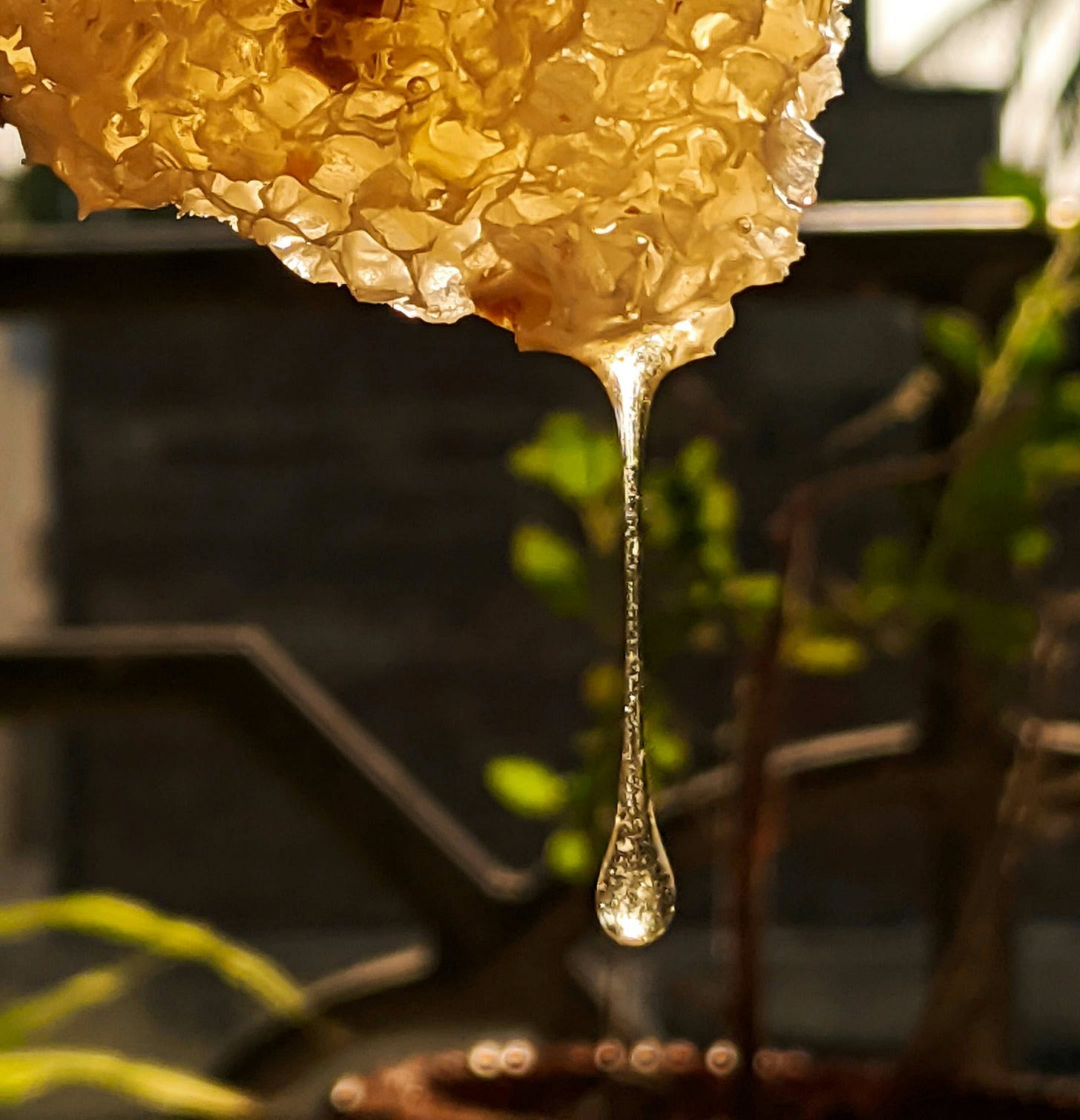When my husband and I travel, we always look for local honey to bring home.
You might call us Honey Connoisseurs - kinda like how Wine Sommelier sounds so professional and refined - but we’re not. I couldn’t tell you which flowers one particular hive frequented, nor could I tell you any country of origin in a blind taste test.
I just like honey.
And it truly does come in a variety of truly natural flavors and colors, without any need for artificial Goo.
My parents went to New Zealand for a trip and we asked them to bring back local honey, if they could (they got us six different kinds!). Globally, New Zealand honey is one of the finest. I don’t know why, and I won’t bother you with these details (Google or AI can tell you).
And, we recently traveled to Maui - there are some wonderful natural honeys there, as well. There’s something about a tropical island far... far away from the mainland that makes honey taste better

What You Didn’t Know about Honey
Natural bee’s honey is one of Nature’s most incredible gifts.
It’s a powerhouse of nutrition, packed with antioxidants, enzymes, and natural sugars that provide a quick energy boost without the crash of processed sweeteners or sugar substitutes.
Raw honey has antibacterial and antifungal properties, making it a time-tested remedy for wound healing and sore throats. It’s also a natural cough suppressant and a great immune booster.

Unlike refined sugar, honey contains trace vitamins, minerals, and beneficial compounds like flavonoids and polyphenols, which help fight inflammation.
Local raw honey (my favorite) is believed to help with seasonal allergies by exposing the body to small amounts of local pollen, potentially reducing sensitivity over time.
Beyond its health benefits, honey is a truly natural sweetener. It enhances flavors in everything from tea and baked goods to marinades and dressings. Unlike processed syrups, it has a rich depth of flavor that varies based on the flowers bees pollinate.
Honey also never spoils. Archaeologists have found pots of honey in ancient Egyptian tombs still perfectly edible after thousands of years.
Honey in Greek Mythology
In ancient Greek mythology, ambrosia was the food of the gods, often associated with immortality and divine sustenance.
It was believed to grant longevity and even eternal life to those who consumed it.
Ambrosia was sometimes described as a heavenly substance, similar to honey, and was often paired with nectar, the drink of the gods.

Sugar Substitutes & Artificial Sweeteners (‘Goo’)
Food producers like to replace the word “sugar” with sugar substitutes to make consumers think that we are eating less sugar.
As it turns out, these substitutes often have a higher glycemic index and spike blood sugar levels far worse than real sugar.
Don’t be fooled by “natural” sugar substitutes.
They are worse than real sugar.
Here are some of the most common culprits:
Agave Syrup – High in fructose, marketed as "natural."
Barley Malt Syrup – Used in processed foods, high glycemic impact.
Beet Sugar – Often genetically modified, processed similarly to cane sugar.
Blackstrap Molasses – A byproduct of sugar refining, contains minerals but is still high in sugar.
Brown Rice Syrup – Made from cooked rice, high in maltose.
Coconut Sugar – Marketed as natural but still affects blood sugar.
Corn Syrup – Common in processed foods, less sweet than high fructose corn syrup.
Dextrose – Chemically identical to glucose, rapidly spikes blood sugar.
Evaporated Cane Juice – Fancy name for unrefined sugar.
Fructose (Isolated) – Extracted fructose (not from whole fruit) disrupts metabolism.
Galactose – Rarely used alone but can contribute to health issues.
Glucose Syrup – Similar to corn syrup, used in processed foods.
Golden Syrup – Inverted sugar syrup, high in sucrose.
High-Fructose Corn Syrup (HFCS) – Found in sodas and processed foods, linked to metabolic issues.
Honey (Commercially Processed) – Often heated and filtered, removing beneficial enzymes.
Invert Sugar – Processed sugar syrup, used in candies and beverages.
Maltose – Sugar derived from malted grains, rapidly absorbed.
Maple Syrup (Commercially Processed) – May contain additives, still high in sugar.
Palm Sugar – Similar to coconut sugar, high in sucrose.
Rapadura – Unrefined cane sugar, minimally processed but still sugar.
Raw Sugar (Turbinado, Demerara, etc.) – Less processed but still mostly sucrose.
Next time you go to a restaurant, ask for honey before putting a packet of Goo in your coffee or tea. And read the label - sometimes those little honey packets are processed fake honey too! Yikes!
If you’re not sure about a specific ingredient and want to learn more about whether it qualifies as Goo, leave a comment or reach out and ask me!
And if you enjoyed reading this story, but aren’t ready to subscribe, you can:
(a Goo-Free coffee, of course!)




